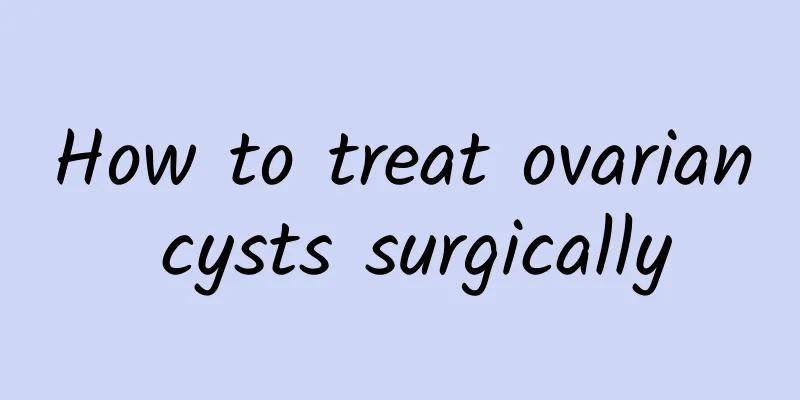How to treat ovarian cysts surgically

|
How are ovarian cysts treated surgically? Ovarian cyst is a very common gynecological disease that often causes ovarian dysfunction and abnormal manifestations of surrounding tissues and organs. The symptoms and hazards of ovarian cysts are mainly divided into the following two situations. 1. Physiological ovarian cyst Physiological cysts can disappear with the cyclical changes of the ovaries. Under normal circumstances, the ovary is a solid tissue. In a few cases, follicular cysts and corpus luteum cysts grow too fast, causing the ovarian tissue to crack and bleed. The blood is wrapped in the ovary and forms a hematoma because they have no outlet. But both cysts and hematomas can gradually shrink and disappear on their own within a few months. 2. Pathological ovarian cyst If the ovarian cyst does not decrease or increases in diameter to more than 6 cm, as well as the cysts in prepubertal girls and postmenopausal women, the possibility of ovarian tumors should be suspected, and further auxiliary examinations and even surgery are usually required for diagnosis and treatment. If ovarian cysts occur, the body will experience the following discomfort: 1. Discomfort in the lower abdomen: This is the initial symptom before the patient feels the lower abdominal mass. Due to the weight of the tumor itself and the influence of intestinal peristalsis and position changes, the cyst moves in the pelvic cavity, involving its pedicle and pelvic funnel ligament, making the patient feel fullness and drop in the lower abdomen or bone fossa. 2. Irregular menstruation: Most ovarian cysts have no obvious early symptoms, and the clinical manifestations are abdominal pain, increased leucorrhea, yellow color, and odor. Patients will experience irregular menstruation, which is specifically manifested as irregular menstrual cycles and increased menstrual volume. 3. Abdominal mass: It is the most common phenomenon in patients with ovarian cysts. Patients realize that their clothes or belts look tight, just notice that the abdomen is enlarged, or feel it by chance in the morning, so they press their abdomen and find that the abdomen is swollen, plus bloating and discomfort. 4. Vaginal bleeding: Malignant ovarian cysts can cause vaginal bleeding. The nature of ovarian cysts. Generally, surgery is considered only when the volume of ovarian cysts is more than 5 cm. |
<<: Will taking birth control pills delay menstruation?
>>: Can ovarian cysts cause back pain? What are the common complications?
Recommend
What measures can be taken to prevent acute vaginitis
What measures can be taken to prevent acute vagin...
What are the symptoms of adenomyosis dysmenorrhea
What are the symptoms of adenomyosis dysmenorrhea...
Introduction to the examination method of menopause
Menopause is an indispensable thing for women. Wh...
Brisk walking or jogging, which one is the real "king of sports"?
Jogging was once regarded as the "king of sp...
What are the symptoms of cervical erosion in women? 5 symptoms of cervical erosion in women
Cervical erosion is a common gynecological diseas...
A brief discussion on the psychological manifestations of female menopause
From a health perspective, the symptoms of menopa...
Endocrine disorders can cause female vulvar leukoplakia
If a woman finds out that she has leukoplakia, wh...
The best way to recover from cervical hypertrophy
There is generally no best recovery method for ce...
How women can prevent premature menopause
The purpose of analyzing the methods of preventin...
Treatment for vulvar itching
After vulvar itching occurs, female friends feel ...
The following methods can help you understand how to prevent irregular menstruation
The prevention methods of irregular menstruation ...
A girl's dream fruit! Sweet persimmons can help you lose weight and replenish blood
As fall and winter arrive, sweet persimmons are a...
What are the effects of eating chili peppers after miscarriage?
After an abortion, the amount of bleeding will gr...
Beware of the three major symptoms of ovarian cysts. What are the treatments for ovarian cysts?
Beware of the three major symptoms of ovarian cys...
Don’t worry about gaining weight in middle age! Lose weight correctly to restore your slim waist
After women enter menopause, their metabolism gra...









